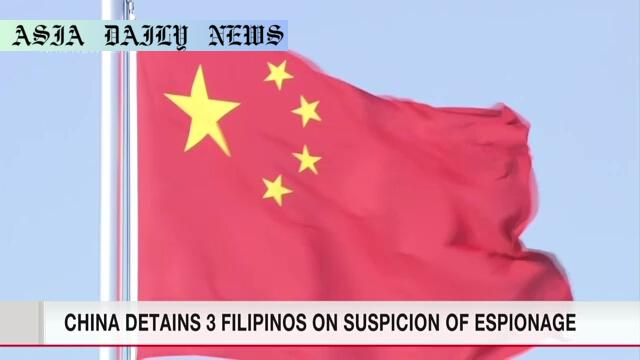Espionage: China’s authorities detain 3 Filipinos accused of collecting confidential military information for the Philippine agency.

China Detains 3 Filipinos for Espionage Accusations
On Thursday, China’s Ministry of State Security announced a controversial development in international relations. Three Filipino nationals have been detained in China on allegations of espionage and surveillance against the Chinese military. These accusations extend to claims that the individuals collected classified military information and were acting under the guidance of the Philippine intelligence agencies. According to state-run Chinese media, such intelligence activities had started as early as 2021.
Espionage Details Revealed: Allegations and Evidence
China’s state media has elaborated on the alleged incidents, presenting videos of the Filipino suspects being detained, their confessions, and apologies for their purported activities. The security authorities revealed that the individuals were tasked with taking covert photographs of restricted military sites and receiving monetary rewards for their efforts. Such actions are strongly condemned by Beijing, citing it as a serious threat to its national security interests amid geopolitical tensions in the South China Sea.
Historical Context and Strained Bilateral Relations
This incident comes against the backdrop of escalating tensions between Manila and Beijing, particularly around territorial disputes in the South China Sea. Over the past decade, both countries have traded accusations of military aggression, maritime violations, and national sovereignty infringements. This recent espionage case intensifies already strained ties, raising concern over the stability of diplomatic relations between the nations.
A Broader Perspective: Intelligence and Counter-strategy
Espionage cases such as these are not rare in geopolitical conflicts, especially when two nations’ interests clash over sovereign territories. However, these allegations—if proven accurate—add an alarming dimension to the lengths governments may extend in collecting intelligence for national strategy and defense. For the Philippines, its role in regional security amid its alliance with the United States adds further complexity to its challenging relationship with China.
Key Implications and Global Observer Opinions
Globally, this latest espionage incident has drawn a substantial amount of attention. Many political analysts argue whether such controversies will push for international mediation to ease tensions in the South China Sea. Furthermore, it raises questions about the ethical boundaries of intelligence collection and the diplomatic protocols countries must adhere to when safeguarding their sovereignty.
Cases such as this often serve as reminders of the fragile underpinnings of regional diplomacy. Countries worldwide await further investigation outcomes into this espionage case and its reverberating impact globally, setting new precedents for how nations monitor perceived adversaries.
Commentary
Espionage and its Far-Reaching Implications
The recent detention of three Philippine nationals accused of spying on Chinese military installations marks yet another layer of complexity in the already strained Sino-Philippine relations. Acts of espionage, especially in a highly sensitive military context, carry serious implications which extend beyond domestic politics and seep into international relations and diplomacy. This particular case not only reveals the ever-present tension in the South China Sea but also sheds light on the dynamics of intelligence and counter-intelligence on a world stage.
Unpacking the Allegations and Cross-Border Tensions
While details of this espionage scandal continue to emerge, the backdrop against which it occurs cannot be ignored. The South China Sea dispute has been a focal point of friction between China and several Southeast Asian nations, including the Philippines. Territorial issues often lead to surveillance and intelligence-gathering techniques that toe the line between securing national interests and infringing on another state’s sovereignty. The Philippines’ alleged part in this reinforces the reciprocal suspicion that has defined its relations with China.
The Role of Media and National Narratives
China’s strategic release of the names, photos, and public apologies of the detained Filipinos speaks volumes about its intent to assert control over the narrative. While this serves to demonstrate its zero-tolerance policy toward espionage, it also reflects Beijing’s prowess in leveraging media to influence public opinion. This coverage not only sends a strong message to Philippine authorities but also fuels a wider regional discussion on the ethical boundaries of surveillance activities.
Moving Forward: Reassessing Bilateral Relations
Ultimately, this event highlights the fragility of the current diplomatic climate. For the Philippines, this case could serve as a wake-up call to address the challenges inherent in maintaining amicable relations with a regional giant like China while staying true to its commitments to its citizens and other international allies. For China, such scandals may dominate the news cycle but also expose vulnerabilities in its internal security and counter-espionage measures.
The resolution of this controversy will likely set the tone for future engagements between China and the Philippines. Whether it leads to further confrontations or paves the way for constructive dialogue remains to be seen, but what is evident is the critical need for a balanced approach to maintaining peace and security in this geopolitically vital region.


